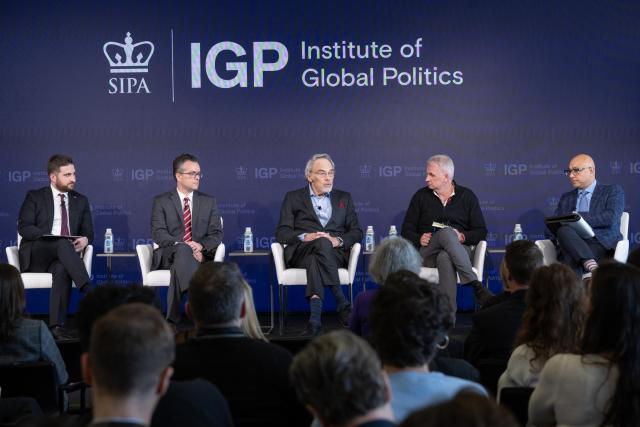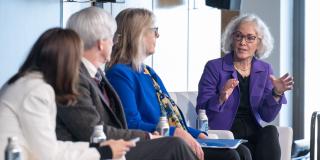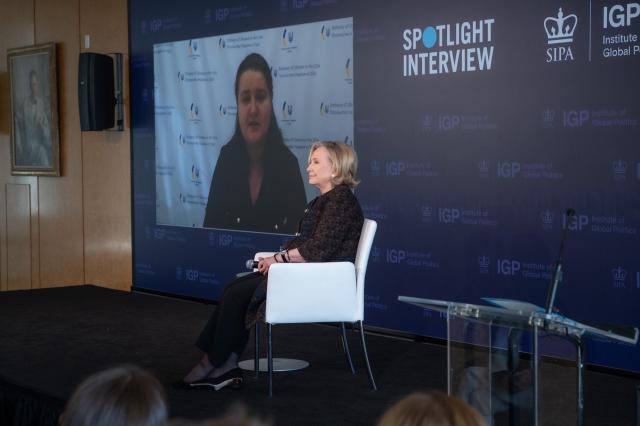
IGP Hosts Experts, Practitioners, and Diplomats to Discuss Future of Ukraine

“When people have the right to choose, they always choose freedom and democracy,” said Oksana Markarova, Ukraine’s ambassador to the United States, in a virtual Spotlight Interview with Secretary Hillary Rodham Clinton. The interview capped off a half day of programming organized by the Institute of Global Politics on February 7 titled “The Future of Ukraine.“
“As academics, policymakers, global citizens, we must ensure that the world doesn't turn away from the Ukrainian struggle,” said Secretary Clinton, who is also chair of the IGP Faculty Advisory Board. She later added that it was “shameful that aid to Ukraine continues to be held up in Congress because of petty politics.”
A pair of panels included several SIPA faculty and prominent scholars, diplomats, and other experts. They discussed the ongoing battle around NATO assistance to Ukraine, the role of the West in rebuilding the country after the war, and what’s needed to ensure long-term peace, stability, and economic recovery for the Ukrainian people.
I believe that the Ukrainians can win on the battlefield with our help. But if we don't help them, they will lose in Washington, and they will lose on the battlefield as well.
— Ambassador Marie Yovanovitch
Marie Yovanovitch, a former US ambassador to Ukraine and current IGP Carnegie Distinguished Fellow, emphasized the progress that Ukraine had made to reach such a point: “It's important to note that the Ukrainians have taken back half of what the Russians took since 2022,” she noted in the first panel, moderated by SIPA Dean Keren Yarhi-Milo.
The rest of the panel sounded less sanguine. “This war is going to remain a war of position in which the battle lines aren’t literally fixed, but in which they’re unlikely to change dramatically any time soon,” said Stephen Biddle, a SIPA professor, IGP affiliated faculty member, and military expert, echoing his recent article in Foreign Affairs.
Kimberly Marten, a Barnard professor, IGP affiliated faculty member, and member of SIPA’s Saltzman Institute, said a true resolution might come only after Vladimir Putin’s death — from natural causes, she hastened to add: “That might be the place at which the fighting finally stops, if there are Russians who come to the realization that continued fighting is not actually in Russian national interests.”
The panelists agreed on the importance of continued aid from NATO members. “The Ukrainians are rationing,” said Ambassador Yovanovitch. “They are being outgunned, three to one.... I believe that the Ukrainians can win on the battlefield with our help. But if we don't help them, they will lose in Washington, and they will lose on the battlefield as well.”

The program’s second panel addressed the massive rebuilding and recovery effort once the war ends.
Irwin Redlener, a SIPA scholar who established the National Center for Disaster Preparedness at Columbia and more recently cofounded the Ukraine Children's Action Project, stressed the need to start planning for recovery as soon as possible.
“We're lousy at recovery,” he said. “Looking at major disasters, we see the remnants of bad planning. [Rebuilding Ukraine] is going to be expensive, clearly. It's also going to be very complicated. It's like assembling the pieces in a four-dimensional puzzle. A lot of things have to happen simultaneously.”
Redlener, who is also an IGP affiliated faculty member, and Timothy Snyder, a professor of history at Yale, held up the post-World War II Marshall plan as a model for rebuilding Ukraine. Both noted how that relatively minor investment benefited not only Europe, but also the United States, which provided the funding.

“Recovery is not something we're doing so the Ukrainians have a better future. It is also something we do so that we have a better future,” Snyder said.
After the panel, Secretary Clinton, building on the Marshall Plan analogy, noted the importance of funding private businesses and community-based efforts, rather than governments.
Ambassador Markarova’s argument that Ukraine remains a bulwark of democracy came in the final segment of the program. Speaking to Secretary Clinton, the ambassador reminded the audience why Ukraine was at war.
“In Ukraine [we] have a full generation of people who never, unlike me, lived under occupation. They were born in Ukraine, they live in Ukraine, and they're dying now for their country on the frontlines. But they're dying not only for our country, but for democratic and European values.”
At a time when President Biden and Congress continue to wrangle over a new aid package to Ukraine, Ambassador Markarova moved the audience to applause with her call for continued support while underscoring her country’s commitment to being part of the global democratic community. “We will be an asset and such an important addition to collective security and collective prosperity,” she said of her country. “But we just have to win first.”
Watch the complete event: